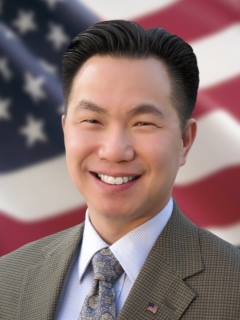SLO County equal voter rights dispute headed to court
June 17, 2018

Tommy Gong
By KAREN VELIE
A dispute over equal voting rights has propelled San Luis Obispo County Clerk Recorder Tommy Gong into a legal battle with Supervisor Lynn Compton. On Monday morning, the county officials will appear in court to argue their positions. [Cal Coast Times]
Following the June 5 election, Gong discovered hundreds of ballots were either missing a signature or had a signature that did not match the voter signature on file. Gong then sent letters to both groups allowing them to correct the issues. At that time, Gong agreed to provide both groups until June 13 to validate their ballots.
However, on June 12, Gong decided to extend the deadline for those whose signatures did not match while he required voters who forgot to sign their ballots to abide by the June 13 deadline.
Stew Jenkins and Charles Bell, Compton’s attorneys, then asked Gong to abide by the date he previously gave voters with mismatched signatures to correct their ballots. Gong, however, said he had the authority to extend the deadline.
Jenkins and Bell then filed a lawsuit asking the court to order Gong to abide by the June 13 deadline because changing the deadline violated voters’ rights to equal protection under the law, and both the voters and Compton’s rights to due process.
Currently, the California Election Code requires clerk recorders to reject vote-by-mail ballots when the signatures do not match. The code does not provide for voters to correct their non-matching signatures
As a result, thousands of California voters have been disenfranchised.

Supervisor Lynn Compton
In an attempt to remedy the issue, in 2017, the ACLU filed a lawsuit arguing that the practice violates equal protection rights because it allows voters to correct missing signatures eight days after an election, while it does not give those with non-matching signatures the same right.
“Section 3019 violates equal protection because it treats signature-mismatch voters worse than it treats similarly situated voters,” the ACLU lawsuit states. “For one, under Section 3019(f), voters who fail to sign their envelopes altogether have until eight days after the election to cure their failure; if they do so, their votes will count. By failing to provide signature-mismatch voters this same opportunity to cure, Section 3019(c)(2) violates equal-protection guarantees.”
While a judge agreed with the ACLU, the decision has been appealed and placed on hold.
In a recent Tribune editorial, the paper’s editors accuse Compton of attempting to disenfranchise voters.
“Compton’s camp is essentially taking advantage of this window to disenfranchise voters — a case of one side opportunistically following the letter of the law, while trampling on its spirit,” according to the Tribune editorial board.
However, while Jenkins and Bell asked the court to provide voters with missing signatures and those with non-matching signatures an equal amount of time to correct their signatures, they did not ask Gong to automatically reject non-matching signature ballots as the Tribune suggested and as the law allows.






The comments below represent the opinion of the writer and do not represent the views or policies of CalCoastNews.com. Please address the Policies, events and arguments, not the person. Constructive debate is good; mockery, taunting, and name calling is not. Comment Guidelines